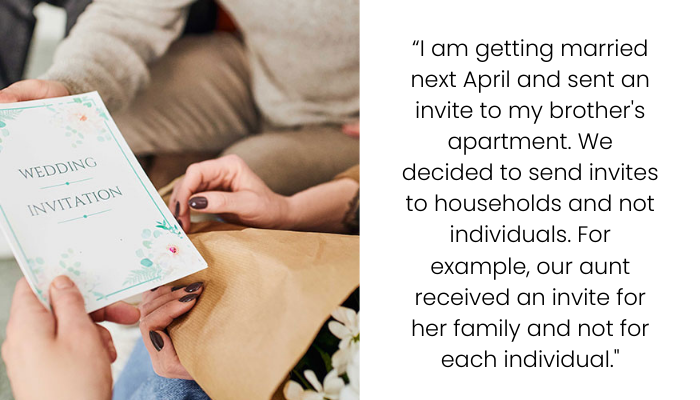Balancing Wedding Etiquette and Family Dynamics: Addressing Plus-One Dilemmas
Weddings often bring to light complex family dynamics and etiquette challenges, particularly when it comes to guest lists and plus-one invitations. In this scenario, a bride-to-be faces a delicate situation involving her brother, his long-term girlfriend Lia, and his close friend Amanda. After inviting her brother and Lia to her upcoming nuptials, she discovers that her brother intends to bring Amanda as his guest instead. Concerned about Amanda’s past behavior and the nature of her relationship with her brother, the bride decides to revoke his plus-one and personally invite Lia. This decision sparks familial tension and raises questions about appropriate boundaries, respect, and the nuances of wedding invitation etiquette.
When one bride sent a wedding invitation to her brother’s apartment, she assumed he’d know it was for him and his GF
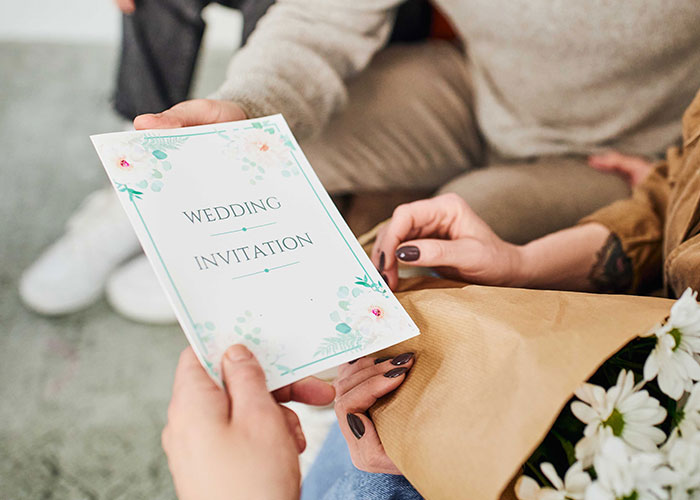
She was left baffled, and angry, when he decided to invite his “mean and cold” female bestie as his +1 instead

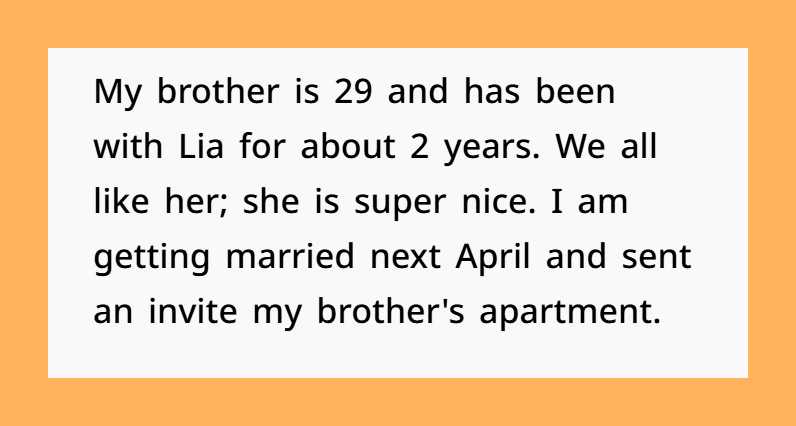
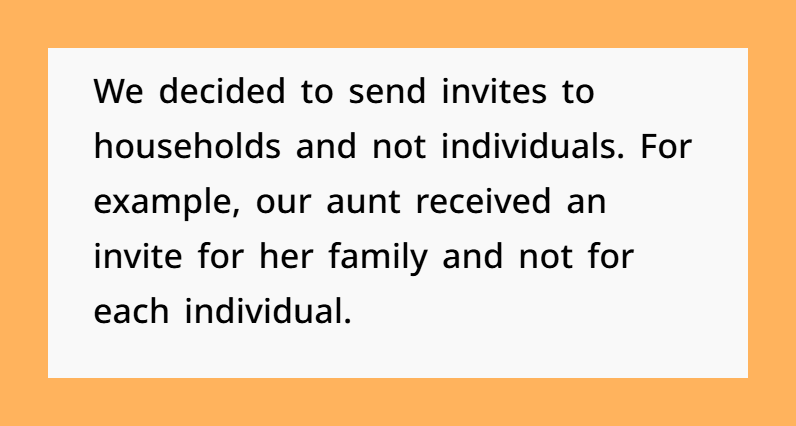
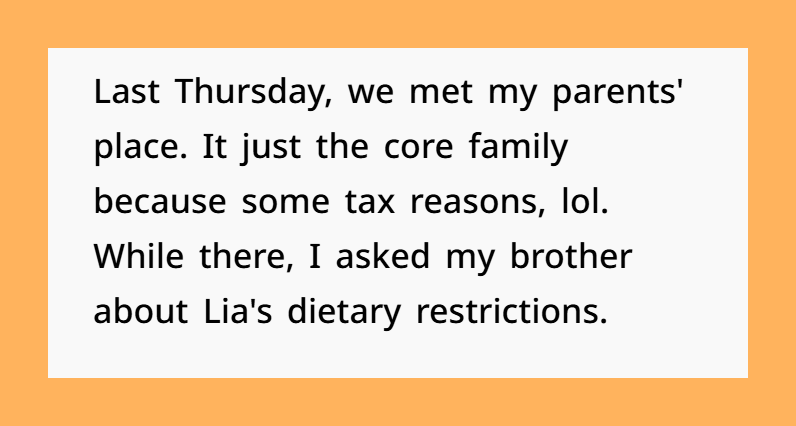
















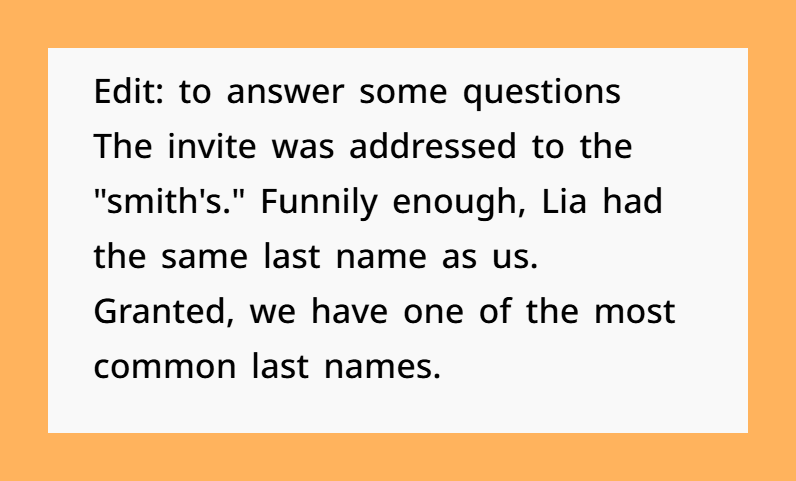


Understanding Plus-One Etiquette in Weddings
Navigating the intricacies of wedding invitations and plus-one etiquette requires a balance between traditional norms and the couple’s personal preferences. Traditionally, invitations are extended to married, engaged, and cohabitating couples, recognizing them as social units. According to Emily Post’s Wedding Etiquette, spouses, fiancés, and live-in partners should receive invitations as a pair, even if the hosts are closer to one individual than the other. This approach acknowledges the significance of their relationship and ensures that both partners feel included and respected.
For guests in long-term relationships who do not cohabit, the decision to offer a plus-one often depends on the couple’s budget, venue capacity, and the nature of their relationship with the guest. It’s advisable to consider the seriousness and duration of the relationship when determining plus-one invitations. Clear communication on the invitation can help manage expectations and prevent misunderstandings.
Addressing Unwanted Plus-Ones and Guest Substitutions
Situations where a guest wishes to bring an uninvited individual or substitute their plus-one can be challenging. It’s essential for the couple to maintain control over their guest list to ensure their special day reflects their wishes and comfort levels. If a guest proposes bringing someone not included in the original invitation, it’s within the couple’s rights to decline politely. Clear and direct communication is key in these scenarios. For instance, a simple statement such as, “We appreciate your understanding, but due to space constraints, we are unable to accommodate additional guests,” can convey the message respectfully.

In the context of the provided scenario, the bride’s decision to revoke her brother’s plus-one after learning he intended to bring Amanda aligns with her prerogative to curate a guest list that ensures a harmonious atmosphere. Given Amanda’s history of disruptive behavior and the ambiguous nature of her relationship with the bride’s brother, the bride’s actions reflect a desire to maintain the integrity of her wedding experience.
Managing Family Dynamics and Potential Conflicts
Family dynamics can complicate wedding planning, especially when decisions about guest lists lead to disagreements. It’s crucial for couples to approach such situations with empathy while standing firm on their decisions. Engaging in open dialogues with family members can help address concerns and explain the reasoning behind certain choices. Emphasizing the importance of the couple’s comfort and the overall guest experience can aid in gaining family support.
In instances where family members react negatively, it’s beneficial to acknowledge their feelings without compromising personal boundaries. Statements like, “We understand your perspective and appreciate your support, but we hope you can respect our decision regarding the guest list,” can help navigate these delicate conversations.
Legal and Ethical Considerations in Invitation Decisions
While wedding invitations are largely a matter of personal choice, it’s important to be aware of any contractual obligations with venues that may dictate guest numbers or seating arrangements. Additionally, ensuring that invitation decisions do not inadvertently discriminate against certain individuals or groups is crucial. Striving for inclusivity and fairness, while balancing personal comfort, reflects ethical consideration in the planning process.
In a surprising twist, Amanda rocked up in the comments section and called the sister an AH






Crafting a wedding guest list involves a delicate balance of etiquette, personal preferences, and family dynamics. Couples have the right to make decisions that align with their vision for their special day, including managing plus-one invitations and addressing potential conflicts. Clear communication, empathy, and firmness are key in navigating these challenges, ensuring that the celebration remains a joyous and memorable occasion for all involved.

